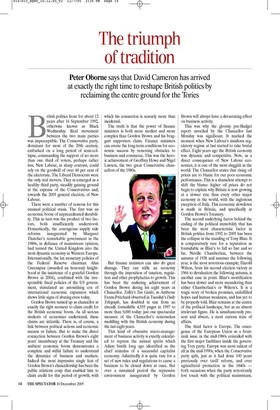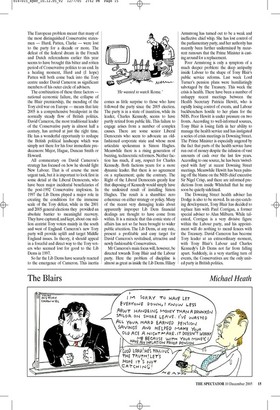The triumph of tradition
Peter Oborne says that David Cameron has arrived at exactly the right time to reshape British politics by reclaiming the centre ground for the Tories British politics froze for about 12 years after 16 September 1992, otherwise known as Black Wednesday. Real movement between the two main parties was imperceptible. The Conservative party, dominant for most of the 20th century, embarked on a long period of semi-collapse, commanding the support of no more than one third of voters, perhaps rather less. New Labour, in sharp contrast, could rely on the goodwill of over 40 per cent of the electorate. The Liberal Democrats were the only real movers. They re-emerged as a healthy third party, steadily gaining ground at the expense of the Conservatives and, towards the 2005 general election, of New Labour.
There were a number of reasons for this unusual political stasis. The first was an economic boom of unprecedented durability. This in turn was the product of two factors, both insufficiently understood. Domestically, the courageous supply side reforms inaugurated by Margaret Thatcher’s remarkable government in the 1980s, in defiance of mainstream opinion, had turned the United Kingdom into the most dynamic economy in Western Europe. Internationally, the lax monetary policies of the Federal Reserve chairman Alan Greenspan (awarded an honorary knighthood at the insistence of a grateful Gordon Brown in 2004), combined with the irresponsible fiscal policies of the US government, stimulated an astonishing era of international economic expansion which shows little signs of abating even today.
Gordon Brown turned up as chancellor at exactly the right moment to claim credit for the British economic boom. As all serious students of economics understand, these claims are infantile. There is, of course, a link between political actions and economic success or failure. But to make the direct connection between Gordon Brown’s eight years’ incumbency at the Treasury and the ambient economic boom demonstrates a complete and wilful failure to understand the dynamics of business and markets. Indeed the most impressive single feat of Gordon Brown’s chancellorship has been the public relations coup that enabled him to claim credit for this period of growth, with which his connection is scarcely more than incidental.
The truth is that the power of finance ministers is both more modest and more complex than Gordon Brown and his braggart supporters claim. Finance ministers can create the long-term conditions for economic success by removing obstacles to business and commerce. This was the heroic achievement of Geoffrey Howe and Nigel Lawson, the two great Conservative chancellors of the 1980s.
But finance ministers can also do great damage. They can stifle an economy through the imposition of taxation, regulation and other prophylactics to growth. This has been the enduring achievement of Gordon Brown during his eight years as Chancellor. Tolley’s Tax Guide, as Ambrose Evans-Pritchard observed in Tuesday’s Daily Telegraph, has doubled in size from an already formidable 4,555 pages in 1997 to more than 9,000 today: just one spectacular measure of the Chancellor’s remorseless meddling with the British economy during the last eight years.
This kind of obsessive micro-management of business activity is exactly calculated to repress the animal spirits which Adam Smith long ago identified as the chief stimulus of a successful capitalist economy. Admittedly it is quite rare for a set of new rules and regulations to cause a business to be closed down at once. But over a sustained period the repressive environment inaugurated by Gordon Brown will always have a devastating effect on business activity.
This was why the gloomy pre-Budget report unveiled by the Chancellor last Monday was significant. It marked the moment when New Labour’s insidious regulatory regime at last started to take brutal effect. Eight years ago the British economy was dynamic and competitive. Now, as a direct consequence of New Labour economics, it is one of the most sluggish in the world. The Chancellor states that rising oil prices are to blame for our poor economic performance. This is a shameless attempt to shift the blame: higher oil prices do not begin to explain why Britain is now growing at a slower rate than every other major economy in the world, with the inglorious exception of Italy. This economic slowdown is made in Britain, and specifically at Gordon Brown’s Treasury.
The second underlying factor behind the ending of the political immobility that has been the most characteristic factor in British politics from 1992 to 2005 has been the collapse in the standing of Tony Blair. It is comparatively rare for a reputation as formidable as Blair’s to fall so fast and so far. Neville Chamberlain, between the autumn of 1938 and summer the following year, is the most notorious example; Harold Wilson, from his second election victory in 1966 to devaluation the following autumn, is another case in point. Blair’s mortification has been slower and more meandering than either Chamberlain’s or Wilson’s. It is a tragic story of broken promises, unfulfilled hopes and human weakness, and has yet to be properly told. Blair remains at the centre of the political landscape, but as an almost irrelevant figure. He is simultaneously present and absent, a most curious state of affairs.
The third factor is Europe. The emergence of the European Union as a frontrank issue in the mid-1980s coincided with the first major faultlines inside the governing Tory party. Europe was most salient of all in the mid-1990s, when the Conservative party split, just as it had done 100 years previously over tariff reform, and over agricultural protection in the 1840s both occasions when the party notoriously lost touch with the political mainstream. The European problem meant that many of the most distinguished Conservative statesmen — Hurd, Patten, Clarke — were lost to the party for a decade or more. The defeat of the federal dream in the French and Dutch referendums earlier this year seems to have brought this bitter and rotten period of Conservative politics to an end. In a healing moment, Hurd and (I hope) Patten will both come back into the Tory centre under David Cameron as significant members of his outer circle of advisers.
The combination of these three factors national economic failure, the collapse of the Blair premiership, the mending of the Tory civil war on Europe — means that late 2005 is a comprehensive breakpoint in the normally steady flow of British politics. David Cameron, the most traditional leader of the Conservative party in almost half a century, has arrived at just the right time. He has a wonderful opportunity to reshape the British political landscape which was simply not there for his four immediate predecessors: Major, Hague, Duncan Smith or Howard.
All commentary on David Cameron’s strategy has focused on how he should fight New Labour. That is of course the most urgent task, but it is important to look first in some detail at the Liberal Democrats, who have been major incidental beneficiaries of the post-1992 Conservative implosion. In 1997 the Lib Dems played a major role in creating the conditions for the immense scale of the Tory defeat, while in the 2001 and 2005 general elections they provided an absolute barrier to meaningful recovery. They have captured, and kept, about one million centrist Tory voters mainly in the south and west of England. Cameron’s new Tory party will provide uplift and target Middle England issues. In theory, it should appeal in a forceful and direct way to the Tory voters who seemed lost for good to the Lib Dems in 1997.
So far the Lib Dems have scarcely reacted to the emergence of Cameron. This inertia comes as little surprise to those who have followed the party since the 2005 election. The party is in a state of inanition, while its leader, Charles Kennedy, seems to have partly retired from public life. This failure to engage arises from a number of complex causes. There are some senior Liberal Democrats who seem to advocate an oldfashioned corporate state and whose most articulate spokesman is Simon Hughes. Meanwhile there is a rising generation of buzzing, technocratic reformers. Neither faction has much, if any, respect for Charles Kennedy. Both factions yearn for a more dynamic leader. But there is no agreement on a replacement; quite the contrary. The Right of the Liberal Democrats greatly fear that disposing of Kennedy would simply have the undesired result of installing Simon Hughes. The result is a shambles: zero coherence on either strategy or policy. Many of the recent very damaging leaks about apparently improper Lib Dem financial dealings are thought to have come from within. It is a miracle that this comic state of affairs has not so far been brought to wider public attention. The Lib Dems, at any rate, present a profitable and easy target for David Cameron’s revitalised, attractive and newly fashionable Conservatives.
Mr Cameron’s main focus will, however, be directed towards Tony Blair and the Labour party. Here the problem of discipline is almost as great as inside the Lib Dems. Hilary Armstrong has turned out to be a weak and ineffective chief whip. She has lost control of the parliamentary party, and her authority has recently been further undermined by recurrent rumours that the Prime Minister is casting around for a replacement.
Poor Armstrong is only a symptom of a much deeper problem: the deep antipathy inside Labour to the shape of Tony Blair’s public service reforms. Last week Lord Turner’s pension plans were humiliatingly sabotaged by the Treasury. This week the crisis is health. There have been a number of unhappy recent meetings between the Health Secretary Patricia Hewitt, who is rapidly losing control of events, and Labour backbenchers hostile to her plans for the NHS. Poor Hewitt is under pressure on two fronts. According to well-informed sources, Tony Blair is losing faith in her ability to manage the health service and has instigated a series of crisis meetings in Downing Street. The Prime Minister is especially angered by the fact that parts of the health service have run out of money despite the infusion of vast amounts of cash over the last few years. According to one source, he has been ‘swiveleyed with fury’ at recent Downing Street meetings. Meanwhile Hewitt has been palming off the blame on the NHS chief executive Sir Nigel Crisp, and there are informed predictions from inside Whitehall that he may soon be quietly sidelined.
The Downing Street health adviser Ian Dodge is also to be moved. In an eye-catching development, Tony Blair has decided to replace him with Paul Corrigan, a former special adviser to Alan Milburn. While talented, Corrigan is a very divisive figure within the Labour party, and his appointment will do nothing to mend fences with the Treasury. David Cameron has become Tory leader at an extraordinary moment, with Tony Blair’s Labour and Charles Kennedy’s Lib Dems not far from falling apart. Suddenly, in a very startling turn of events, the Conservatives are the only united party in British politics.


























































 Previous page
Previous page